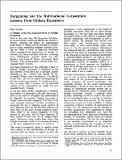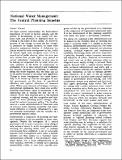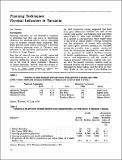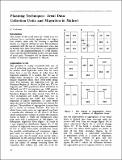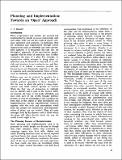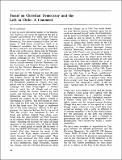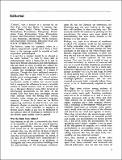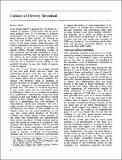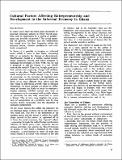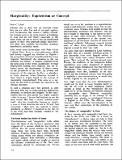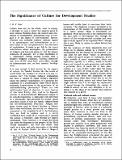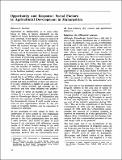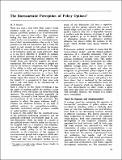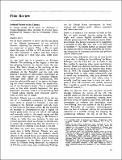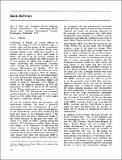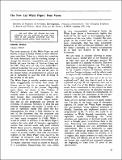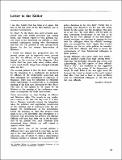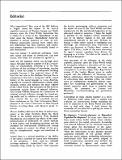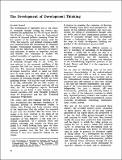1968 - 1979: Recent submissions
Now showing items 241-260 of 380
-
Bargaining and the Multinational Corporation: Lessons from Chilean Experience
(Institute of Development Studies, 01/07/1976)SUMMARY If neo?classical theories of foreign investment are rejected then approaches to direct foreign investment bargaining, as a form of planning, have a special importance. The assumptions on which the neo?classical ... -
National Water Management: The Central Planning Impetus
(Institute of Development Studies, 01/07/1976)SUMMARY A national water administration must ensure that water is available where it is needed at the least financial and environmental cost: thus planning capability is more important than operational efficiency. The ... -
Planning Techniques: Physical Indicators in Tanzania
(Institute of Development Studies, 01/07/1976)SUMMARY Following an introductory discussion of levels of infant mortality in Tanzania, some indices developed in research and planning work with reference to the provision of health facilities in Iringa Region before and ... -
Planning Techniques: Areal Data Collection Units and Migration in Malawi
(Institute of Development Studies, 01/07/1976)SUMMARY Three problems with areal data collection units are identified, namely aggregation levels, areal boundaries and the size and shape of areal units. Examples are drawn from Malawi. RESUME Les Techniques de ... -
Planning and Implementation: Towards an ‘Open’ Approach
(Institute of Development Studies, 01/07/1976)SUMMARY ‘As if’ planning an ‘as is’ world is rejected, and a semantic rather than an experimental approach suggested towards an ‘open’ concept. RESUME Planification et Exécution: vers une Approche ‘Ouverte’ On ... -
Tomi? on Christian Democracy and the Left in Chile: A Comment
(Institute of Development Studies, 01/07/1976)SUMMARY This article criticizes the argument of Radorniro Tomi?, (see ‘Reflections on the Coup d'Etat in Chile’, IDS Bulletin vol.7 no. 3, October 1975) according to which there was a possibility of an agreement between ... -
Editorial
(Institute of Development Studies, 01/09/1976) -
Culture of Poverty Revisited
(Institute of Development Studies, 01/09/1976)SUMMARY Most commentators on urban poverty reject the idea that the culture of poor people has anything to do with their poverty. By stressing material and physical factors only, they support the dominant approach in ... -
Cultural Factors Affecting Entrepreneurship and Development in the Informal Economy in Ghana
(Institute of Development Studies, 01/09/1976)SUMMARY A study of Ghanaian entrepreneurs in 1968/69 reveals some of the factors which condition the chances of informal sector enterprisers expanding their business to formal sector dimensions. The difficulties they face ... -
Marginality: Euphemism or Concept
(Institute of Development Studies, 01/09/1976)SUMMARY Where students of African cities spoke of ‘detribalization’, Latin American social scientists speak of ‘marginality’, in reference to the relation of shanty town dwellers both to the dominant culture (the emphasis ... -
The Significance of Culture for Development Studies
(Institute of Development Studies, 01/09/1976)SUMMARY Though many arguments for the role of cultural factors in development have been circular or ideological, development is necessarily a culturally determined process. It is an attempt to realize certain aspirations ... -
Opportunity and Response: Social Factors in Agricultural Development in Maharashtra
(Institute of Development Studies, 01/09/1976)SUMMARY Provision of irrigation facilities and encouragement to expand cooperatives were among the main strategies which were followed for agricultural development in Maharashtra. Different social groups responded differently ... -
The Bureaucratic Perception of Policy Options
(Institute of Development Studies, 01/09/1976)SUMMARY Two recent conferences of rural development administrators prompt reflection on the source and nature of the ‘programmatism’ which appears to dominate thinking on rural development policies—the emphasis on ... -
Political Fiction in the Cinema: A Review article of , directed by Helvio Soto
(Institute of Development Studies, 01/09/1976) -
Beyond Dependency: The Developing World Speaks Out Guy F. Erb and Valeriana Kallab (editors)
(Institute of Development Studies, 01/09/1976) -
The New Aid White Paper: Four Views
(Institute of Development Studies, 01/09/1976) -
Letter to the Editor
(Institute of Development Studies, 01/09/1976) -
Editorial
(Institute of Development Studies, 01/03/1977) -
The Development of Development Thinking
(Institute of Development Studies, 01/03/1977)Summary This article examines some of the main trends in the evolution of development thinking over the last 25 years or so, from three main perspectives: the nature of the political economies that constitute the object ... -
Inter?Regional Cooperation in the Social Sciences: The Latin American Experience
(Institute of Development Studies, 01/03/1977)Summary The development of the Latin American social sciences in the last three decades has been affected by serious imbalances. At the beginning of the 1960s intra?regional links between research and training institutes ...

